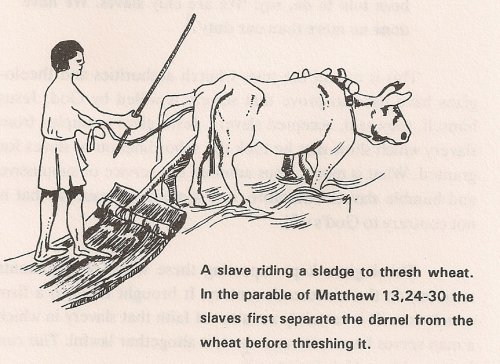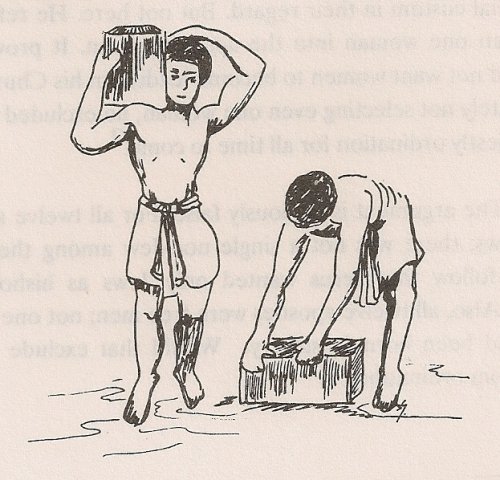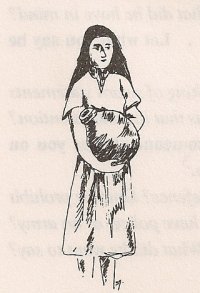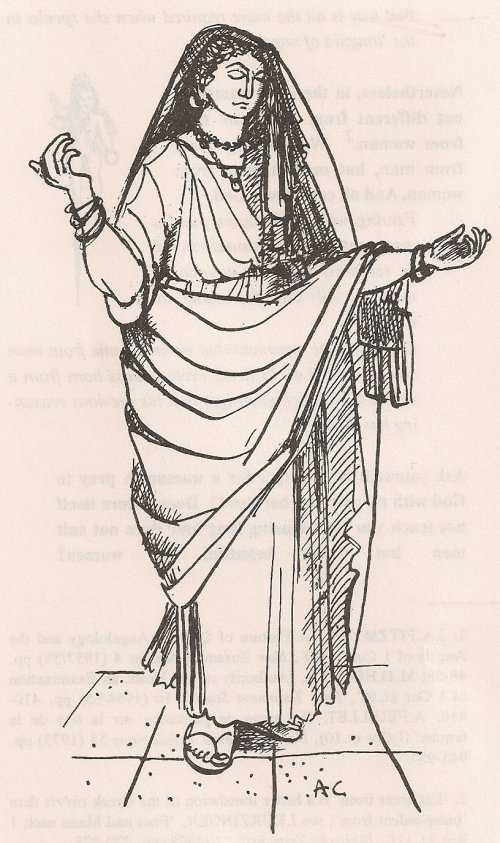
 Christians in past centuries committed flagrant acts of injustice. They
kept other human beings as slaves. They denied women their full rights. They
favoured the rich above the poor. They colonised other races. This slide back
into pagan practices is sad, indeed. Even more scandalous was their claim to be
following God's will. Christians justified their unchristian behaviour with
quotes from Scripture.
Christians in past centuries committed flagrant acts of injustice. They
kept other human beings as slaves. They denied women their full rights. They
favoured the rich above the poor. They colonised other races. This slide back
into pagan practices is sad, indeed. Even more scandalous was their claim to be
following God's will. Christians justified their unchristian behaviour with
quotes from Scripture.
There is a wellknown saying among theologians that even the devil can quote Scripture. (1) History confirms the danger. Hundreds of heresies have been proclaimed and thousands of blunders committed on the strength of Scripture texts that have been wrongly understood.
The inspired text needs to be read carefully. God speaks through human authors and what they say in his name follows all the rules of ordinary human language. God does not say more than the human author intended to say. In this chapter we will make some important observaions that will help us understand the inspired message more accurately. We may then avoid the pitfalls so many have tumbled into.
Let us start from basics and take a simple example. In Matthew we find this important admonition of Jesus:
Love your enemies.
Pray for those who treat you badly.
In this way you will become true children of your heavenly Father.
For he causes his sun to rise on bad and good people alike,
and makes his rain fall on dishonest as much as on honest people. (Matthew 5, 44-45.)
The general meaning is straightforward enough. But suppose we want to probe further and ask ourselves what is meant by the statement that God 'causes his sun to rise'? We could fall into the trap of thinking it is the words that matter, and so just look up a dictionary. This is what fundamentalists (2) and literalists (3) do. They think they can establish the meaning of the phrase by the meaning of the words. However, this can seriously mislead.
In the sixteenth century, for instance, the astronomer Copernicus had begun to show that it is not the sun that moves around the earth, but the earth that encircles the sun. Literalist Christians rejected this finding as impossible because, they said, 'it goes against the inspired Scriptures'.
Matthew 5,45 was one text quoted to prove this claim. For Jesus says: 'The Father makes the sun rise . . . . ' Therefore, it is the sun that moves and not the earth, they said. (4) On the strength of this interpretation, in 1633 Galileo Galilei was ordered by the Holy Office in Rome to retract his belief that the earth circles round the sun, and condemned to house arrest till the end of his life!
But if the words by themselves do not fix the meaning, where do we find it? The answer is: in the so-called 'literal sense'. The literal meaning of a text, as opposed to the 'literalist' meaning, is the meaning which the original speaker or writer intended. In other words, we should ask ourselves: what did this person want to say? We may not read more into a piece of writing, or less, than what its author actually had in mind.
When Jesus adduced the example of his heavenly Father, he did not want to teach astronomy. Modern science lay outside his scope and would have been beyond the grasp of his audience anyway. The question whether it is the earth that lies at the centre or the sun, is not touched by the literal meaning of his words. Jesus just uses an everyday expression we still do today. We say: 'the sun rises', inspite of our better astronomical knowledge!
We are talking here about an important principle which applies to all authors of Scripture. What it means, in fact, is that since God speaks through human authors, that is: using their human mind and heart and way of speaking, we will only know what God was trying to say by knowing what his human instrument wanted to say. (5) We can formulate this as a first basic principle:
1. We must know what the human author wanted to say before we can come to any conclusions as to what God is telling us.
Let us take another passage from the Gospels that has been frequently misquoted.
Suppose one of you has a slave who returns from the fields after ploughing or minding the sheep, will he say to him: 'Sit down now and have your meal'? Will he not more likely say: 'Get my supper ready. Tidy up and serve me while I eat and drink. You yourself can have your meal afterwards'? Will he be grateful to his slave for doing what he was told? In the same way, when you have done all you have been told to do, say: 'We are only slaves. We have done no more than our duty'. (Luke 17,7-10.) (6)
This is one of the texts Church authorities and theologians have used to prove that slavery is willed by God. Jesus himself, they said, accepted slavery. Jesus gives examples from slavery which show that he took the subordination of slaves for granted. What is more, Jesus admired the service of submissive and humble slaves. Therefore, it is something beautiful that is not contrary to God's will. Theologians kept repeating these kinds of arguments until late in the nineteenth century. It brought them to a firm conclusion: 'It is certainly a matter of faith that slavery in which a man serves his master as a slave, is altogether lawful. This can be proved from Holy Scripture.' (7)
What is the fallacy in the argument taken from the Gospel?
The mistake is to assume that when Jesus uses examples from real life, he approves of what he describes. Sure, we can learn something from the example, and this is the message. But as to the example itself, he simply takes it as a common occurrence, as a fact we observe in society.
 |
A slave riding a sledge to thresh wheat. In the parable of Matthew 13,24-30 the slaves first separate the darnel from the wheat before threshing it.
Jesus says the Son of Man will come as a thief in the night. (Matthew 24,42-44.)
Does he thereby recommend stealing?
Jesus praises the dishonest manager. (Luke 16,1-13.)
Does he condone cheating in business?
Jesus compares God to a crooked judge who is hard on the poor. (Luke 18,1-8.)
Does he teach God is corrupt?
Jesus describes a king who punishes a shabbily dressed guest. ( Matthew 22,11-14.)
Is this a lesson in good manners?
The Good Samaritan poured wine and oil on the man's wounds. (Luke 10,34.)
Should doctors follow this practice?
In text after text we see Jesus giving many descriptions, often detailed and always taken from real life. It does not take a lot of intelligence to see that they are no more than illustrations. The same applies to the examples Jesus takes from slavery.
In this case, Jesus' attitude is also clear from what he says in other texts. For, while he describes the ordinary master as someone who expects to be served by his slave, this is not what he expects a Christian to do.
This is what Jesus says we should be like:
Who wants to be the greatest among you, must be your servant.
Who wants to be the first, must be your slave.
The Son of Man also came, not be served, but to serve. (Matthew 20,26-28.)
If I, your Lord and Master, have washed your feet, you too should wash each other's feet.
For, I tell you, no servant is greater than his master. (John 13,14-16.) (8)
Yes, we can learn the value of service from a hard working and humble slave. But it is clear that Jesus does not condone the way masters treated their slaves, or that he recommended enslavement as acceptable Christian behaviour.
What we have discussed so far is expressed in professional language, by saying that we should determine what the author wants to say by the literary form he uses. A 'literary form' is any specific kind of speaking or writing which follows its own rules of interpretation.
When reading a newspaper, for example, we have to distinguish such literary forms as 'a report' (factual events); an editorial (the opinion of the paper); advertisements (claims made by sales people); and letters to the editor (views by private individuals).
The literary form we are here considering is that of the 'parable' and the 'comparison'. When Jesus employs parables and comparisons, we should distinguish the story itself, with its images and illustrations, from the point of the story, that is: what Jesus wants to teach. In the creation accounts we made a similar distinction between the form of presentation and the teaching conveyed through that presentation. Again, we can formulate this as a general principle.
2. In many texts we have to distinguish between the details of image and form and the central teaching.
 |
Let us proceed further by studying another text. Jesus, we are told, prayed for a whole night. Then he called certain people to himself, 'those whom he wanted'. They were the twelve apostles, chosen to become the leaders of the future Church.
These are their names: first Simon who is called Peter, and his brother Andrew; James the son of Zebedee, and his brother John; Philip and Bartho- lomew; Thomas, and Matthew the tax collector; James, the son of Alphaeus, and Thaddaeus; Simon the Zealot and Judas Iscariot. ( Matthew 10,1-4; Mark 3,16-19; Luke 6,13-16.)
These were twelve men. There was not a single woman among them! On other occasions, certain people argue, Jesus showed great sensitivity to women. More than once he broke with social custom in their regard. But not here. He refused to take even one woman into the apostolic team. It proves that Jesus did not want women to become leaders in his Church! By deliberately not selecting even one woman, he excluded women from priestly ordination for all time to come. (9)
The argument is obviously false. For all twelve apostles were Jews; there was not a single non-Jew among them. But does it follow that Jesus wanted only Jews as bishops and priests? Also, all twelve apostles were free men; not one among them had been born in slavery. Would that exclude former slaves from ordination?
The truth is that Jesus chose twelve free, Jewish men because in the social conditions of his time that was the most practical thing for him to do. Jesus had only a limited scope: to begin the recruitment of future leaders. In no way did he intend to decide for future generations that certain categories of people should be excluded from leadership. That was simply outside the scope of his action at that moment.
The same applies to what the New Testament says in the socalled household code passages. They suggest how people in different conditions of life should behave. Here is one typical extract:
WIVES, be subject to your husbands, as is proper in the Lord.
HUSBANDS, love your wives. Do not treat them harshly . . .
SLAVES, obey your earthly masters in everything; not only when you are under their supervision, as if you only had to please human beings, but with sincerity, out of respect for the Master. Whatever your job is, put your whole heart into it, as a service to the Lord and not for human beings. For you know that the Lord will repay you by making you his heirs. It is Christ the Lord that you are serving ....
MASTERS, treat your slaves justly and fairly. Realise that you too have a Master in heaven. (Colossians 3,18 - 4,1.)
The scope of such passages is, obviously, to encourage Christian households to live together in harmony. Christian leaders probably copied the practice of having such lists of instructions from the Jews, who used to instruct proselytes in i similar ways. (11) The specific form the suggestions take derive partly from a new Christian perspective and partly from the standard expectations of society at the time. (12) The intention is to guide Christian families within the specific situation of the time.
And that is also the limitation. For the catechists who taught these household codes did not address such fundamental questions as the basic equality of men and women, or the inalienable right of every slave to be a free person. That was simply outside their scope. Such basic matters are touched upon elsewhere, when Paul asserts that there is no distinction between men and women, free person or slave, Greek or Jew. (13) Here the purpose is simply immediate, practical advice.
It is, therefore, entirely wrong to claim that these household texts give inspired backing to slavery and to the subjection of women to men. But this is precisely how they have been used by theologians in the past, and how they are still being used by some fundamentalist Christians today. The mistake lies in imputing an intention to the inspired authors which they did not have.
Think about these passages:
Do not call yourself 'teacher', for you have one Teacher and you are all brothers and sisters. Call no man 'father' on earth, for you have one Father, who is in heaven. (Matthew 23,8-9.)
Does Jesus really forbid these titles?
What did he have in mind?
I tell you, do not take any oaths .... Let what you say be simply 'Yes' or 'No'. (Matthew 5,33-37.) (14)
Does Jesus ban the taking of sworn statements in court?
Was that his real intention?
Do not offer resistance to violence. If someone strikes you on the right cheek, turn to him the other too. (Matthew 5,38-41.) (15)
Does Jesus veto self defence?
Does he prohibit a state to have police, or an army?
What did he want to say?
Costly mistakes have been made by people who read Scripture superficially; who believe it is the sound of the words and not the intention of the speaker that matters. To assess that intention requires common sense and study. Let us sum up these paragraphs in another principle.
3. We may not ascribe statements or intentions to a biblical author which lie outside his scope.
We must now turn to a Pauline text that has become a classic source of muddled theological thinking. Paul was writing to the Christian community at Corinth.
 |
He had heard from some Christians who visited him in Ephesus, that there were uncontrolled scenes of trance and speaking in tongues during their prayer meetings. (16) It would seem that, as an expression of ecstatic frenzy, some women would be tempted to take off their veils and loosen their hair.
Perhaps, they prayed with their arms raised high and their heads thrown back as was the custom in certain oriental cults. (17)
This must have upset other members of the community. Paul worried about it because it threatened to destroy order and peace. He decided that the practice should be stopped. A factor that may have complicated matters is that Christian men had given up the Jewish practice of praying with a prayer mantle over their head. They prayed 'with uncovered face' to reflect the glory of Christ. (18) Some women may have asked why they could not do the same thing? Paul tried to explain why. (19)
What I want you to understand is that the head of every man is Christ, the head of a woman is her husband, and the head of Christ is God. Any man who prays or who speaks prophecies with his head covered dishonours his head. But any woman who prays or speaks prophecies with no veil on her head dishonours her head - it is the same as if her head is shaven. For if a woman does not want to wear a veil, then she should cut off her hair. But if a woman is ashamed to be shaven bald, she should wear a veil.
The case for men and women is different, Paul argues. For a woman who wears her hair loose is a disgrace to her husband: loose hair was the sign of a woman suspected of adultery. (Numbers 5,18.) And, with an apparent reference to oriental cults where devotees are shaven bald, Paul says: 'If you imitate them, why don't you shave off all your hair?'
For a man should not cover his head for he is the image of God and
reflects God's glory.
But a wife reflects her husband's glory. For man was
not created from woman, but woman from man. Neither was man created for woman,
but woman for man.
To press his point further, Paul adduces a popular Jewish argument based on the second creation story. ( Genesis 2,5-25.
)Though the story intends to teach the equality of man and woman, Jewish commentators read into it woman's dependence: she is from man and for man.
That is why a woman should keep authority over her head, because of the angels.
The precise sense is obscure. Scholars often translate 'authority' with 'a sign of being under authority' (= a veil). It is also possible that Paul states a woman should keep control over her head, with her hair pinned up and covered (see pin below). This was a sign of respect and propriety.
Protecting her head (and indirectly her husband) in that way is all the more required when she speaks in 1 the 'tongues of angels'. (20)
Nevertheless, in the Lord woman is not different from man, nor man from woman. Woman may come from man, but man is born from woman. And all come from God.
Fearing, with good reason, that his argument may be misunderstood, he reaffirms the basic equality of women. All are the same in Christ.
Moreover, the argument that woman came from man can be turned on its head: every man is born from a woman! Paul acknowledges that his previous reasoning has flaws.
Ask yourself: is it proper for a woman to pray to God with no cover on her head? Does nature itself not teach you that wearing long hair does not suit men but looks beautiful on women?
 |
For a woman's hair has been given as an ornament to her.
Paul now appeals to people's common sense. Long and well groomed hair makes a woman dignified and attractive. Should she not pray to God like that? But Paul realises this argument too is weak, conditioned as it is by custom and culture.
And if anyone still wants to argue: we recognise no other practice, nor do the other Christian communities.
Paul concedes that his reasoning is open for discussion. He ends up by simply putting his foot down. The practice will not be tolerated because it creates disorder. 'God is not a God of disorder but of peace'. (1 Corinthians 14,33.)
If we analyse this passage, we find that Paul is really pleading for order and peace in the community. For that reason he does not want women to pray with their long hair hanging loose. But it is wrong to conclude from the text that Paul promulgated a law by which women of all times and in all cultures were required to wear a veil in Church. (22)
Neither is it correct to think that in his reasoning Paul promulgated inspired doctrine about the submission of women to men. He was simply arguing his point, as any worried pastor would, pleading and 'thinking aloud', aware of the inherent weaknesses in what he was saying. Imputing doctrinal weight to such passages is erroneous and unfair.
We tend to forget that Paul was a human being like anyone of us. When we try to persuade people to follow some course of action, we adduce all kinds of reasons and motives, some better, some worse. We are aware of the fact that such reasonings only serve to support a point we want to make. They may not be lifted out and made into solemn pronouncements that stand on their own.
Consider another example of such popular reasoning in Pauline letters. Paul tells the Christians of Corinth that they should stop quarrelling. They are just one community. He is annoyed about the fact that some claim they 'belong to Paul'.
Have you been baptised in the name of Paul?
(1) I am grateful that I baptised none of you . . .
(2) except Crispus and Gaius, of course . . . otherwise
(3) you might be saying you were baptised in my name!
(4) I also baptised the household of Stephanas . . .
(5) but no one else as far as I can remember.
(6) For Christ did not send me to baptise but to preach the Gospel.(1 Corinthians 1,10-17; esp. vs 13-17.)
Is it not manifest here that Paul is here 'thinking on his feet'? - He probably walked up and down, dictating the letter to a scribe. (23) He contradicts himself from one phrase to the next, recalling the people he baptised, but then admitting he cannot precisely remember. Is this a divine oracle articulating inspired dogmas, or a human pastor looking for words? Would it be fair to lift out some of these phrases by themselves and challenge Paul with them? I am grateful I baptised none of you! and Christ did not send me to baptise (What about Christ's injunction: 'Go out, make disciples of all nations and baptise them'?) (Matthew 28,18-20.)
From all this we can formulate another principle that needs to be kept in mind when reading Scripture texts.
4. We have to distinguish substantial statements by the author from popular reasoning in which he expresses his own human opinions.
In this chapter we have discussed a number of rules which help us to discern the correct interpretation of Scripture. Underlying them all is the fact that God does not teach anything more than or different from what the human authors intended to teach.
In New Testament times the principle of the basic equality of all human beings in Christ was clear. Its precise effect on social customs of the time was not. This would require centuries of further reflection, prayer and conversion. But one thing is undeniable: When we distinguish teaching from illustration, and substance from popular reasoning, we find that these authors do not teach the submission of slaves or women.
1. There are still Christians today, known as Creationists, who believe Genesis 1,1 - 2,3 teaches that God created the universe in six actual days. Can you explain why they are wrong, using the principles discussed in this chapter?
2. Titus, the Bishop of Crete, is told to be firm with troublesome convert Jewish proselytes who upset the community by insisting that Christians ought to be circumcised. Among other things he is given this instruction:
One of themselves, a prophet among them, has witnessed:
'Cretans are always liars, beasts and gluttons',
and this statement expresses the truth. So correct them with severity! Read Titus 1,10-13.
Is this an inspired pronoucement confirming that Cretans are always liars, beasts and gluttons?
3. What about this advice given to Timothy?
'Stop drinking just water. Drink a little wine. It will ease your indigestion and frequent illnesses.' 1 Timothy 5,23.
Is this a revelation from God on the benefits of drinking wine?
4. In 1 Corinthians 14,34 Paul states:
'Women are to keep silent in the (Church) assemblies. They are not allowed to speak but should be subordinate as the Law says.'
Does this bar women from tasks in the liturgy such as giving an introduction, reading, intercessions . . . ?
1. Matthew 4,6.
2. The American Bible League in 1902 produced a series of 12 pamphlets called ‘The Fundamentals’, in which the traditional interpretation of Scripture was defended against modern Scrip- ture studies. Fundamentalists thus became a term to denote conservative Christians who hold on to a set of narrow, anti-scientific and often intolerant doctrines.
3. Literalists derive the meaning of a text from the superficial meaning of the words, without reference to the context or literary form. A 'literalist' interpretation should not be confused with a 'literal' interpretation!
4. Another text (mis)used in the same way was Joshua 10,12-15, in which Joshua is said to have made the sun stand still.
5. The Second Vatican Council endorsed the literal meaning as the inspired meaning of Scripture:
'All that the inspired authors, or sacred writers, affirmed should be regarded as affirmed by the Holy Spirit . . . The interpreter of the Sacred Scriptures, if he is to ascertain what God has wished to communicate, should carefully search out the meaning which the sacred writers really had in mind, that meaning which God had thought well to manifest through the medium of their words'. Divine Revelation, nos. 11-12; Vatican Council II, ed. A.FLANNERY, Dominican Publications, Dublin 1975, pp. 756-757.
6. see also Matthew 10,24-25; 13,27-28; 18,25; etc.
7. From a standard work: LEANDER, Questiones Morales Theologicae, Lyons 1692; Volume 8, De Quarto Decalogi Precepto, Tract.IV, Disp. I, Q.3. Even the Holy Office in Rome which was supposed to guard the purity of Catholic doctrine, still declared on 20 June 1866: 'Slavery itself, considered as such in its essential nature, is not at all contrary to the natural and divine law, and there can be several just titles of slavery and these are referred to by approved theologians and commenta- tors of the sacred canons.... It is not contrary to the natural and divine law for a slave to be sold, bought, exchanged or given'; J.F.MAXWELL, 'The Development of Catholic Doctrine Concerning Slavery', World Jurist 11 (1969-70) pp.306- 307.
8. Washing his master's feet was a legal sign by which a slave expressed his subservient position; J.D.M.DERRETT, 'Domine, tu mihi lavas pedes?', Bibbia e Oriente 21 (1979) pp. 13-42. See also Luke 3,16.
9. G.W.WENHAM, 'The Ordination of Women: Why is it so decisive?', Churchman 92 (1978) no 4. 1.
10. see also Ephesians 5,22 - 6,9; 1 Peter 2,18-3,7; 1 Timothy 6,1-2.
11. D.DAUBE, The New Testament and Rabbinic Judaism, London 1956, pp. 90-140, 336-351.
12. D.SCHROEDER, Die Haustafeln des Neuen Testaments, Hamburg 1959; J. E. CROUCH, The Origin and Intention of the Colossian Haustafel, Gottingen 1972; W.LILLIE, 'The Pauline House-tables', The Expository Times 86 (1975) pp. 179-183.
13. Galatians 3,28; Colossians 3,11; Romans 10,12; see p. 163 above.
14. Notice, Jesus himself speaks under oath in Matthew 26,63-64.
15. Jesus himself protests when he is struck on the cheek (John 18,22-23). Read also Romans 13,4.
16. An impression of what took place can be gained from 1 Corinthians 14,1-33.
17. R.E.WITT, Isis in the Greco-Roman World, Ithaca 1971; see also J.Z.SMITH, 'Native Cults in the Hellenistic Period', History of Religions 11 (1971/72) pp. 236-249; R. and K.KROEGER, 'An Inquiry into Evidence of Maenadism in the Corinthian Congregation', SBL Seminar Papers 14 (1978) vol. 2, pp. 331-346.
18. 2 Corinthians 3,18.
19. 1 Corinthians 11,2-16; see J.B.HURLEY, 'Did Paul require Veils of the Silence of Women?', Westminster Theological Journal 35 (1972/73) pp. 190-220; J.MURPHY-O'CONNOR, 'Sex and Logic in 1 Corinthians 11,2-16', Catholic Biblical Quarterly 42 (1980) pp. 482-500; 'St.Paul: Promoter of the Ministry of Women', Priests People 6 (1992) pp. 307-311; E.SCHUSSLER FIORENZA, In Memory of Her, London 1983, pp. 227-230.
20. J.A.FITZMYER, 'A Feature of Qumran Angelology and the Angels of 1 Cor 11:10', New Testament Studies 4 (1957/58) pp. 48-58; M.D.HOOKER, 'Authority on her Head: an Examination of I Cor xi.10', New Testament Studies 10 (1964/65) pp. 410- 416; A.FEUILLET, 'Le signe de puissance sur la tete de la femme' (1 Cor ix.10), Nouvelle Revue Théologique 55 (1973) pp. 945-954.
21. 'Different from' is a better translation of the Greek chôris than 'independent from'; see J.KÜRZINGER, 'Frau und Mann nach 1 Kor 11,11f, BiblischeZeitschrift 22 (1978) pp. 270-275.
22. Wearing a veil was a requirement laid down in Church Law until this century.
23. See 1 Corinthians 16,21; compare Romans 16,22.